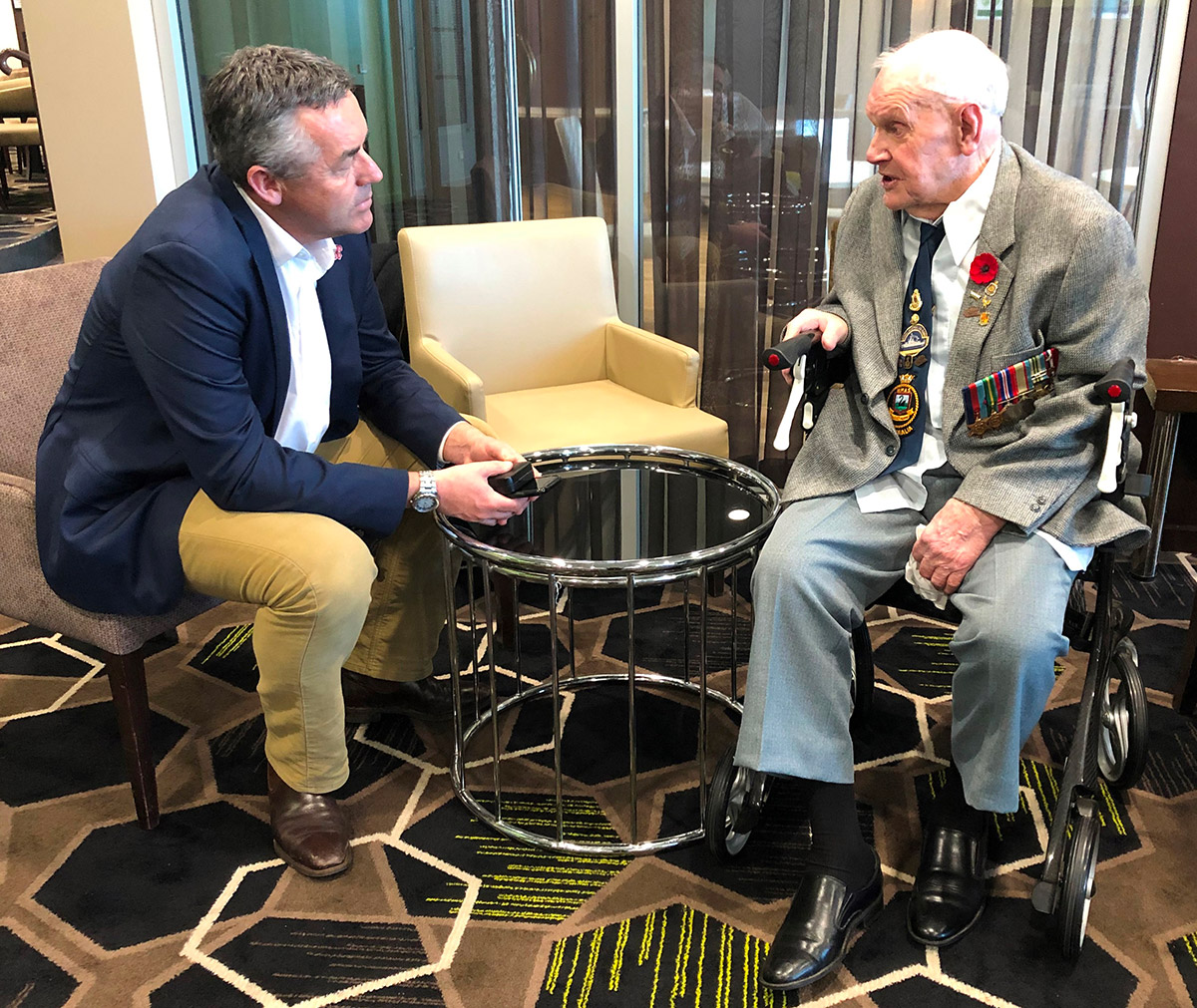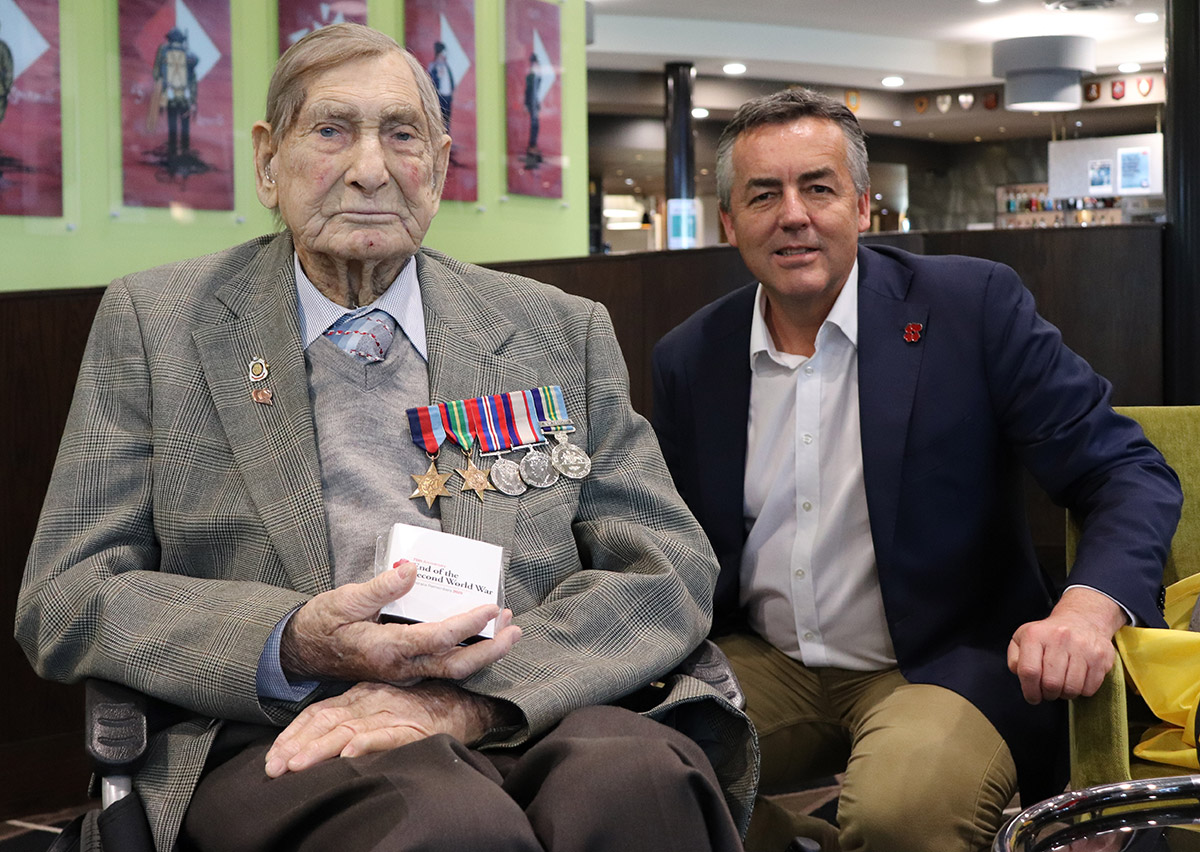News from the Minister

The Hon Darren Chester MP
Minister for Veterans’ Affairs
Minister for Defence Personnel
Improving veteran mental health and employment
The Government is continuing to put veterans and their families first, delivering the essential services they rely on with more than $340 million in new measures announced as part of the 2020–21 Budget.
First and foremost, I want to advise you all that the recommendations put forward by the Productivity Commission relating to the Gold Card will not be accepted by this Government. This was announced in the Budget and forms part of our interim response to the Productivity Commission’s report. I trust this provides certainty about our commitment to the ex-service community.
We are also providing $113.2 million through the Department of Social Services for two $250 economic support payments. These will be available to more than 225,000 veterans and their families to help support and stimulate the Australian economy and are part of the ongoing response to the global coronavirus pandemic. To find out if you’re eligible, visit the DVA website (dva.gov.au/esp).
In these uncertain times, the Government has prioritised initiatives that bolster access to mental health support, improve the transition to civilian life and increase access to employment.
The Government has provided $101.7 million to further bolster mental health support, including:
- $94.3 million to improve mental health outcomes and ensure high-quality care for our older veterans and their families, and to better support their transition to civilian life by increasing fees paid to mental health, social work and community nursing providers.
- $2.4 million to expand eligibility for the Coordinated Veterans’ Care program, which provides GP-led team-based care to White Card holders with a mental health condition accepted as related to their military service.
- $5.0 million to expand the 24/7 Open Arms — Veterans & Families Counselling, especially in regional and remote areas.
The Government has recognised that the transition process of leaving the Australian Defence Force (ADF) and re-entering civilian life, including finding employment, is a crucial step. The Government has invested significantly in these areas, ensuring Defence now takes a needs-based approach to transition and expanding the transition for employment (T4E) program and the Personalised Career and Employment Program (PCEP). Building on these successful initiatives, the Budget will invest $23.7 million for increased transition and employment support.
This funding includes $17.7 million over four years to establish a Joint Transition Authority, ensuring all transition services and supports are working together for ADF members and their families during this critical phase — a key recommendation of the Productivity Commission’s report.
In addition, the Government is continuing its investment in veterans’ employment with $6 million to increase job opportunities for veterans and to provide support for ADF personnel considering starting their own business.
Through the successful Prime Minister’s Veterans’ Employment Program we have seen some incredible examples of veterans’ entrepreneurship and we know veterans bring many sought-after qualities to the civilian workplace.
Funding provided in this Budget will help those veterans interested in starting their own business with training, advice and resources, giving them the support they need to get their ideas off the ground.

Minister Chester reviews the Budget 2020 documents.
TPI and Productivity Commission reports
The Budget also included responses to two important reports.
Firstly, the Productivity Commission’s report, A Better Way to Support Veterans. I know this report has been the subject of great discussion in the ex-service community and since the Government tabled it I have received a wide range of feedback about its recommendations and findings.
On 8 October, I tabled the Government’s interim response to the Productivity Commission in Parliament, addressing 25 of the report’s 69 recommendations. The Productivity Commission’s report is wide ranging and complex, and we are committed to consulting with the ex-service community to consider and address the remaining recommendations as part of our final response to be provided as part of the 2021–22 Budget.
Second is the Independent Review into the Totally and Permanently Incapacitated (TPI) Payment by Mr David Tune AO PSM.
Mr Tune’s review is the third assessment into issues raised by the TPI Federation around the TPI Payment, with the previous two being the KPMG Review of TPI Benefits and the Productivity Commission’s report.
The Government has accepted the recommendations in the report by Mr Tune, as well as providing $25.9 million in the Budget to deliver additional assistance, including increased support for those TPI veterans who live in rented accommodation (Recommendation 15.1 of the Productivity Commission’s report).
All three reviews have consistently found that there is insufficient evidence to support a broad increase in the TPI payment. While I can appreciate this is not the outcome the TPI Federation had hoped for, the Government has exhaustively investigated their claims and responded positively to all the recommendations put forward by Mr Tune.
Further information on these can be found on the DVA website.
Second World War 75th anniversary
As part of the Budget, the Government allocated $1.1 million to commemorate the 75th anniversary of the end of the Second World War. This occurred over a 75-day campaign from 2 June 2020 in the lead-up to the milestone date on 15 August (see 75th anniversary section of this edition).
It was an opportunity to acknowledge the service and sacrifice of the almost one million Australians who served our nation, the 39,000 who died, the some 30,000 who were prisoners of war, and the support and fortitude of millions of Australians on the home front.

Minister Chester lays a wreath at the cenotaph in Sale, Victoria.
I paid my respects by taking part in a private wreath-laying ceremony at the cenotaph in my home town of Sale, Victoria. I also had the honour of presenting Second World War veterans in the area with their 75th anniversary commemorative medallions and certificates from the Australian Government, on behalf of a grateful nation.
There are around 12,000 Second World War veterans with us today. If you’re one of them, I encourage you (or a family member on your behalf) to register by contacting DVA on 1800 VETERAN (1800 838 372 or via the Commemorative medallion page. While we can never repay the debt we owe you as a nation, this is just another small way we can say to you as an individual ‘thank you for your service’.


Left: Presenting a Commemorative Medallion to Second World War veteran Jack Macartney. Right: Presenting a Commemorative Medallion to Second World War veteran Tom Smith in Bairnsdale
2020
This year has been a difficult one and I am proud that veterans have stepped up to support one another — helping with bushfire recovery and keeping in touch during the pandemic.
I want to assure veterans and their families that they are at the forefront of the Government’s thinking. If you are struggling, I urge you to reach out. Help is available and you don’t have to go it alone.
Open Arms — Veterans & Families Counselling is available on 1800 011 046 1800 011 046 or www.openarms.gov.au.
